Junk Drawer
Published Friday, October 07, 2005 by modium.
Welcome to my junk drawer. I wasn't kidding. These are the posts I make that aren't related to specific movies, really. I'll actually describe them when I'm not so exhausted.
Da list. - 7/16/05 - This is long out of date, but it's a list of all the films I own but haven't seen. I've since added a bunch, but watched a bunch too. Hopefully, soon, this list won't exist.
The Complete Monterey Pop Festival - 7/18/05 - My thoughts on Criterion's Complete Monterey Pop Festival set.
New flix - 7/21/05 - I bragged about some films I'd gotten recently. It's only here for posterity.
Favorite Films (always changing) - First posted 7/24/05, revised 3/31/06 - Yup, my favorites.
ZOMFG one month annnie-vercityz!!11 - 7/31/05 - Musings on my first month of blogging.
Errol Morris - 8/04/05 - An assesment of a bunch the work of documentary filmmaker Errol Morris. One of my favorites that I've written.
Me and Ingmar Down by the Schoolyard - 8/10/05 - I talk all about how much I love Ingmar Bergman and how his films relate to myself.
I just couldn't help myself. - 8/20/05 - It speaks for itself, I have no self-control.
...Because You Can't Watch Films All the Time - Vol. 1 - 9/01/05 - Vol. 1 of my thoughts on film books I've read.
Notes on Juliet of the Spirits - 9/15/05 - A transcription of notes I took while watching Fellini's Juliet of the Spirits, which made no sense to me when I tried to write about the film.
State of the Blog Address - 10/3/05 - I babble on about stuff relating to the most popular blog on the interbutt, mine.
George Washington or: Why I'd Never Be a Good Critic - 11/09/05 - Very interesting piece where I discuss George Washington and my own thoughts on film criticism and how I view films.
My Robert A. Harris Post - 11/27/05 - I gush over great DVDs I've bought; I try to do it as well as Robert A. Harris does; I don't.
...Because you can't watch films all the time - Vol. 2 - 12/01/05 - Vol. 2 of my thoughts on film books I've read.
YGGR. - 4/04/06 - A fascinating quote and theory that I had to share with my fellow cineastes.
Da list. - 7/16/05 - This is long out of date, but it's a list of all the films I own but haven't seen. I've since added a bunch, but watched a bunch too. Hopefully, soon, this list won't exist.
The Complete Monterey Pop Festival - 7/18/05 - My thoughts on Criterion's Complete Monterey Pop Festival set.
New flix - 7/21/05 - I bragged about some films I'd gotten recently. It's only here for posterity.
Favorite Films (always changing) - First posted 7/24/05, revised 3/31/06 - Yup, my favorites.
ZOMFG one month annnie-vercityz!!11 - 7/31/05 - Musings on my first month of blogging.
Errol Morris - 8/04/05 - An assesment of a bunch the work of documentary filmmaker Errol Morris. One of my favorites that I've written.
Me and Ingmar Down by the Schoolyard - 8/10/05 - I talk all about how much I love Ingmar Bergman and how his films relate to myself.
I just couldn't help myself. - 8/20/05 - It speaks for itself, I have no self-control.
...Because You Can't Watch Films All the Time - Vol. 1 - 9/01/05 - Vol. 1 of my thoughts on film books I've read.
Notes on Juliet of the Spirits - 9/15/05 - A transcription of notes I took while watching Fellini's Juliet of the Spirits, which made no sense to me when I tried to write about the film.
State of the Blog Address - 10/3/05 - I babble on about stuff relating to the most popular blog on the interbutt, mine.
George Washington or: Why I'd Never Be a Good Critic - 11/09/05 - Very interesting piece where I discuss George Washington and my own thoughts on film criticism and how I view films.
My Robert A. Harris Post - 11/27/05 - I gush over great DVDs I've bought; I try to do it as well as Robert A. Harris does; I don't.
...Because you can't watch films all the time - Vol. 2 - 12/01/05 - Vol. 2 of my thoughts on film books I've read.
YGGR. - 4/04/06 - A fascinating quote and theory that I had to share with my fellow cineastes.
The Return (2003)
Published by modium.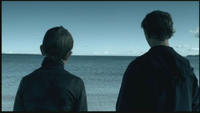 The Return (2003)
The Return (2003)Once again, Exiled has convinced me. This time, it's the debut of Andrei Zvyagintsev. He compared it to Tarkovsky, so how could I resist? And, if you read his comments on the film, whether you know who Tarkovsky is (and can't see his somnolent genius), it's doubtful you'd be able to resist.
As far as the film goes, I was very, very impressed. It's got that languid pacing, that meditative, hypnotic feeling that all of Tarkovsky's masterpieces have. And, at the same time, it feels somewhat mainstream. Mostly, due to its plot and traditional style of storytelling (well, traditional in comparison to most art-film). But, it doesn't suffer because of this, it's only enriched by its deep and enigmatic story. And hey, if it uses this to draw in a viewer and potential open his or her eyes to great cinema, then I'm all for it.
Despite its rich detail, beautiful atmosphere and incredible emotional resonance, I may have to say its strongest suit is its ending. It's funny, because it's bound to frustrate a lot who see it, and rightfully so, but I really loved it, and all the questions it raised. It really leaves a lot to the imagination, and while sometimes the technique can make a film fall flat on its face, here it's a true asset to the work. What I love is that everyone has their unique interpretations as to what happened, if anything even happened at all. You're forced to think, forced to plumb the depths of your mind and your soul to comprehend what you've just seen, and try to put all the pieces together on your own.
A beautiful moment in the film is one of the last scenes, where their Father dies. Up to this time, we've seen the film through the childrens' eyes because the Father has been a prick, for the most part, and we emphasize with them. Yet, it's during this scene that our sympathies lie with the Father, because we really see how irrational and unfairly young Ivan is acting towards him. It's a great moment, because we can look back and see that he has been fairly harsh throughout the film, but it's only now that our sympathies shift ever so slightly, that we see it. Then, moments later, the tragedy occurs.
Of course, the ending is ambiguous, so did a tragedy really occur? Were they looking at an alternate photo, or did the Father never even really exist? And what was with the phone calls and the mysterious box he put into the boat? Was he trying to tell them something, or was this just their imaginations being overactive.
While I'm thinking about it, the entire subplot involving the Father's work was well-done. The scene where he is on the phone while his sons get mugged out on the street, it's perfectly intercut. While watching, your mind immediately becomes preoccupied with the children, because you hope they don't get hurt at all. The intercutting is so well, that most viewers might completely forget all about the phone call in retrospect, because they were far more concerned with the kids' well-being. The film is full of little touches like that, slight, subtle manipulations that really play with the audience and force them to think more.
Despite the ending potentially ruining theories on the Father, I still thought the concept was very interesting. This is what amounts to a miracle for the kids, their Father has returned out of the blue. While it's miraculous, it's very mysterious at the same time. Of course, it turns out not to be so much a blessing, as the Father treats them pretty badly (but, your interpretation of the ending could potentially justify him, again.) It reminds me of a line from Fight Club: "Our Fathers were our models for God. If our Fathers failed us, what does that tell you about God?" I think it has some significance here, because, generally, a Father is supposed to be a wonderous person, who leads you down all the right path, encourages you and inspires you, and does all he can for you. Yet, these kids, who have been lacking this for so long, are stuck with this complete stranger offering none of these things.
I really don't know what else to say about The Return. It's a haunting masterpiece, and I can't believe it's only a debut. I really hope to see more from Zvyagintsev, and I hope to see it theatrically, to boot.
La Dolce Vita (1960)
Published Thursday, October 06, 2005 by modium.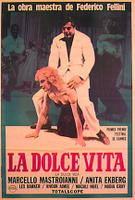 La Dolce Vita (1960)
La Dolce Vita (1960)So, La Dolce Vita. Fellini's grand masterwork, at least one of them. It's a great film, but to me, felt a little long. I'm not one to complain, but I'm just not a fan of long stories. And it's funny, I don't really think that there was anything unnecessary in La Dolce Vita, nothing I think stood out enough for me to say it should have been edited out, it's just that the entire film seems a little too long. But, it is what it is, and it's a great film no less, a tour de force if you will.
I guess Marcello, the lead character, is in search for something more in his life. It's strictly implied by Fellini, which helps the movie along far more than something heavy-handed would. He's sometimes asked about the book that he's been working on, but we never really know anything about it, and Marcello himself shrugs it off. What I found most interesting was the struggle between his searching for something more and simply miring in 'la dolce vita'. Really, there is no struggle, as you'd expect. It's very slight, something that manifests itself sometimes. Most of the time, Marcello's decision is already made, and he's simply living this empty life, content to be drunk and ignorant.
L'Atalante (1934)
Published Wednesday, October 05, 2005 by modium.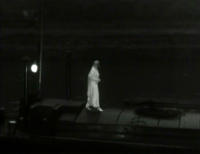 L'Atalante (1934)
L'Atalante (1934)I first really started paying attention to L'Atalante when I read Truffaut's book, The Films In My Life. He wrote a great chapter on Jean Vigo, who unfortunately died at 29 after only making 3 films. Truffaut had nothing but praise for Vigo's films, especially L'Atalante. In fact, he never shut up about it.
I don't know why, maybe it's the generation gap, but L'Atalante didn't do much for me, emotionally nor did it do much to hold my interest. The storyline was intriguing enough, and I love a good romantic drama, but the film just felt dated to me, I suppose. Kind of antiquated. Which is strange, because, by comparison, Renoir's films feel very fresh and lush to me.
Although, I did enjoy seeing Juliette's turmoil in the film. Here, she thought that she was marrying this seafaring man and going to travel to grand places and have adventures. But, instead, she's left to languish on the stuffy ship, performing menial chores. Finally, she meets a Parisian entertainer who, in so many words, offers her everything that she's been wishing for. Oh, what's a girl to do?
The high point of the film, of course, is Michel Simon's fantastic performance as Pere Jules, the ship's first mate (?) He really steals the show, and dominates just about every scene he's in. It's not really an attention-grabbing role though, so it doesn't ruin the picture, just accentuates it and adds to it.
State of the Blog Address
Published Monday, October 03, 2005 by modium.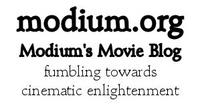
My fellow Interneticans...My thoughts on some recent rumblings in regards to this blog.
- I haven't been writing much lately. It's mostly due to laziness, but I have been hit by the flu, which really affected my desire to sit on the PC and type. But, as you'd imagine, my desire to lie back and enjoy the film was unaffected. I'm just about all caught up with every film I've seen now, so hopefully, things are back to normal.
- The image at your left is a little logo-type thing I whipped up in a few minutes. It's mostly for my own use, printing up small cards to hand out to people I chat with about film, but feel free to do what you wish with it.
- I'm going to be introducing a new page soon, something along the lines of a junk drawer. Basically, just an archive of things I write that aren't about specific films that would go in the archive. No big whoop.
- This site can now be reached through typing up modium.org or www.modium.org. Two bucks a year, thanks Yahoo!
- In case you haven't noticed, I've been adding screens of films to go along with my writings. Just another little thing I'm trying out, and I think it works pretty well. I try to choose an image that spoke most to me during the film, without being too heavy on the spoilers. Hope you enjoy.
- I've been hitting the theater a whole lot more lately, and I don't think that's going to change anytime soon. So, you can look forward to my thoughts on some far more current films. Yeehaw.
- I know I'm a little late, but I'd like to observe the death of legendary director and editor Robert Wise. I haven't seen many of his films, but those I have seen (The Day the Earth Stood Still, The Set-Up, The Haunting) have been nothing short of great. Not to mention his brilliant editing work on Citizen Kane and other great films. Rest in Peace, Robert Wise.
- Some ideas I'm cooking up for the future: Some film festivals, basically just a week or more of particular directors' works, notably Kurosawa, Kubrick and Tarkovsky. Also, I'm considering doing a week or maybe a few days of nothing but reader requests. Yes, you tell me what to watch and I'll watch it and babble about it just for you. Just an idea, but feel free to let me know your thoughts on them, or anything else I've babbled about here.
Pinocchio (1940)
Published by modium. Pinocchio (1940)
Pinocchio (1940)Now, I've already covered my Disney history in my Toy Story post. Truthfully, it's hard for me to find much to say about Pinocchio. Well, I could go on for hours talking about each little gag that I loved, but I doubt anyone would want to read that. The truth is that Pinocchio, like the best of Uncle Walt's work, put a smile on this cynical old coot's face for a solid 88 minutes.
What I love most about Disney films is the amount of detail in every scene, in every frame. They're all so lovingly animated, so full of life. It's impossible to describe the way the characters move in a Disney film, but it's always instantly recognizable to the eye. The films, and Pinocchio being one of the best and certainly one of the best examples of this, are always incredibly full of life. There's so many little gags going on, like Figaro swiping at just about everything, Cleo's shy flirtations, Jiminy Cricket's affable nature. I can't help but love every single moment of Pinocchio. I can't help but feel that anyone who thinks otherwise must be made of wood. (Bad pun, I know.)
The Cutting Edge: The Magic of Movie Editing (2004)
Published by modium.
The Cutting Edge: The Magic of Movie Editing (2004)
There's not much I can say about a documentary about making movies. I can say, though, that it's a fantastic, engaging and very informing look into the work of the unsung heroes of film; the editors. No matter how much you may know about cinema, you'll probably still be humbled by the tremendous effect that even the subtlest of editing work can have on a movie. And if you know nothing about the art of film, it's one of the best places you can start and come out with a great understanding of this 'art with no future.' (Audible wink)
There's not much I can say about a documentary about making movies. I can say, though, that it's a fantastic, engaging and very informing look into the work of the unsung heroes of film; the editors. No matter how much you may know about cinema, you'll probably still be humbled by the tremendous effect that even the subtlest of editing work can have on a movie. And if you know nothing about the art of film, it's one of the best places you can start and come out with a great understanding of this 'art with no future.' (Audible wink)
Terminal Station (1953)
Published by modium.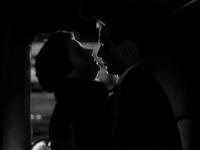 Terminal Station (1953)
Terminal Station (1953)What a long journey it has been. It took me a long time to find De Sica's original cut of Indiscretion of an American Wife. Went through two online rental services and came up empty-handed. Considered shelling out $25 for the film when my library surprised me by getting the Criterion DVD in.
The story of the production is nearly as interesting as the film itself. Selznick wanted De Sica to make a typical Selznick-style film, or read the original treatment for the film, I'm not sure which came first. Either way, they worked together, and De Sica made his film. Selznick test screened it to poor results, so he took it upon himself to cut the 89-minute film down to 63 minutes, and add a few random songs because, hey, we're told people like songs. Yes, David O. "don't you dare touch my 4-hour Gone With the Wind!" Selznick. I didn't watch Indiscretion of an American Wife, Selznick's cut, so I can't compare the two.
As a film, it struck me as very melodramatic. In fact, it feels very Hollywood to me, mostly due to the extremely obtrusive music score. It felt very far removed from De Sica's earlier Neorealist films. Thinking more about it, I can see the touches, such as filming entirely on location in the train station, and the struggle of the characters. But, Neorealism was more about man vs. society, whereas Terminal Station is about man vs. his or her own desires.
I have to wonder about the treatment of Italian men in Italian cinema. Of course, in films like the Bicycle Thieves, the male lead is a dignified hero of sorts. But, in films based on romantic situations or, for example, those by Antonioni, the Italian male is often categorized as brutish with a complete lack of understanding. Examples are La Strada, Il Grido, and Divorce Italian Style to name a few. Clift, one of my favorite screen actors, is an Italian-American, and he's not very understanding for most of the film. Towards the end of the film, he wises up a little, just enough to earn some synpathy from the audience. But, really, what gives, Italy?
All or Nothing (2002)
Published by modium.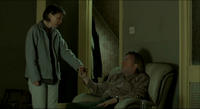 All or Nothing (2002)
All or Nothing (2002)So, with Criterion's upcoming...well, Criterion's new release of Naked (damn, that one snuck up on me), I decided to go back to some of Mike Leigh's films. I'd already seen Vera Drake, which was very good, and despite my not writing about it, it was one of the films that inspired me to start this blog. I decided on All or Nothing rather than Secrets and Lies, simply because it sounded more interesting to me at the time. And lucky me, I found All or Nothing to be a really enjoyable, emotional look into the lives of people who could easily be real.
It presents a very real, very honest portrait of lower-middle-class folks living in the UK. What impressed me most was the mundanity of the characters in the film. None of them are glamourized or romantic in any way, they're just normal people with their own share of faults. In fact, most of them don't do much to win our sympathy, because they're mostly all pretty selfish and stuck up. But, it's a testament to the reality of the story that despite that, we do feel for them when tragedy befalls them.
There's this great moment late in the film, after Phil and Penny have exchanged words, where Penny retreats upstairs to her daughter, Rachel, for comfort. She asks Rachel if she does talk to Phil like he claimed, and she tells her honestly that it's true. Instead of placating her mother, she tells her the bare truth, knowing that it's the best thing to do in the long run. Penny gets up, realizing that she's been wrong, then hesitates. She decides against it and continues to walk away. This is a small gesture that just feels so real, and speaks volumes about her character, more than any amount of dialogue could.
Harakiri (1962)
Published Sunday, October 02, 2005 by modium. Harakiri (1962)
Harakiri (1962)I've heard great things about Harakiri, so despite the USPS's fumblings, I finally procured a copy! And that said, it's truly an awesome piece of filmmaking. For the longest time, I've wanted to see Kobayashi's Kwaidan, but for one reason or another, I still haven't. Kind of funny that I'm seeing a DVD released years after I wanted to see Kwaidan, before Kwaidan. But Criterion, she is a cruel and fickle mistress.
It seems to me that most Japanese films, and not just those by Ozu, are filled with a certain stillness. It just seems to be a natural characteristic, and definitely lends them a unique feel. Harakiri is no different, and the sense of stillness, in terms of editing and camerawork, even spilling over into the performances, really does a lot for the tension. I'll have to say that it's one of the most suspenseful films I've seen in a while. I really couldn't wait to see how everything unfolded, right until the credits rolled. But, it's very story-based, and as interesting as it is to see it all play out, I have to wonder how it would hold up under repeat viewings. But, that's probably just a moot point.
Most interesting to me was the ritual of harakiri itself, of seppuku in Japanese. I knew some things about it, but the sense of ritual in the film is fascinating. They have to lay out a mat for the samurai, with a second samurai waiting beside him. He reaches towards a wooden stool, picks up his sword, and plunges it into his stomach. He then pulls it to the side, literally spilling his guts out in front of him. When the second is satisfied that he's sacrificed enough, he cleanly decapitates him, ending his suffering. Wow. Just wow.
The Fog of War: Eleven Lessons from the Life of Robert S. McNamara (2003)
Published by modium.
The Fog of War: Eleven Lessons from the Life of Robert S. McNamara (2003)
So, it's already been documented that I love Errol Morris' work. So, it's weird for me to have to think about Fog of War. I have to approach it from a detatched point of view, because personally, while watching the film, it didn't hold my interest much, probably because of the subject matter. But, it's definitely a well-made documentary, and despite its subject matter, overall, it is very interesting.
McNamara has led a long and interesting life, so he's got plenty of stories to tell and, believe it or not, lessons to impart. The film paints a very level portrait of McNamara, a man who most would consider a monster. It shows him for what he is, just a human being, for better or worse. He comes off as very professional and detatched from his feelings, which is probably essential for a job like his. Even so, it's hard to hear him complaining because his soldiers are afraid of death. But, it's a testament to Morris' skill that you can understand where McNamara is coming from, even if you completely disagree with him.
And I'll say this; all these years later, that grainy footage is still harrowing and disturbing.
So, it's already been documented that I love Errol Morris' work. So, it's weird for me to have to think about Fog of War. I have to approach it from a detatched point of view, because personally, while watching the film, it didn't hold my interest much, probably because of the subject matter. But, it's definitely a well-made documentary, and despite its subject matter, overall, it is very interesting.
McNamara has led a long and interesting life, so he's got plenty of stories to tell and, believe it or not, lessons to impart. The film paints a very level portrait of McNamara, a man who most would consider a monster. It shows him for what he is, just a human being, for better or worse. He comes off as very professional and detatched from his feelings, which is probably essential for a job like his. Even so, it's hard to hear him complaining because his soldiers are afraid of death. But, it's a testament to Morris' skill that you can understand where McNamara is coming from, even if you completely disagree with him.
And I'll say this; all these years later, that grainy footage is still harrowing and disturbing.
Elephant (2003)
Published by modium. Elephant (2003)
Elephant (2003)So, continuing with Gus Van Sant's trilogy, I watched Elephant, as per Exiled's recommendation. For those of you keeping track at home, I despised Gerry. Thankfully, that's not the case with Elephant. A great, hauntingly beautiful film.
In fact, I have to wonder why I disliked Gerry so much, yet felt so differently towards Elephant. There are some long stretches of Elephant without dialogue or plot, really. But, I think in Elephant, they add to the mood of the film effectively, whereas in Gerry, they really hinder the film. Why, I have no idea, but that's just the feelings I get.
The longest scene in Elephant is gorgeous. The camera is still, and we see some students playing different sports in the background. People walk in front of the camera, and one girl even stops and looks around, as if looking to uncover the mystery of this spot. Maybe she's straining to hear Beethoven's Moonlight Sonata, which has always been a favorite of mine, which also makes an appearance here. Eventually, a guy walks in front of the camera, pulls on a jacket, and walks off with the camera following him. He makes his way through different parts of the school grounds as we observe the daily routines for these kids. It's almost strictly a mood-setting shot, but it's stunningly gorgeous.
I read somewhere that it involved a re-telling of the Columbine Massacre, which stayed in the back of my mind. I wondered if it was just some false information after a while, until John is walking out of the school and you see the two kids with duffel bags and fatigues. At that moment, it's a jolt to your heart, and before you realize it's just a movie, fear takes over and paralyzes you for just a moment, but long enough to stick with you.
I remember after the Columbine incident, everything was changed in US schools. Previously, I'd been bullied to no end in school, and very little had been done about it. I'd just had to grow thick skin and try to avoid it when I could. After Columbine, security in all schools was ramped up to an insane degree. I remember a friend of mine was suspended because someone stole her pen and she snatched it back, playfully remarking that she was going to kill him. There was a big push for counseling, too. Nobody wanted it to happen again, so they were always encouraging people to talk to someone if they had a problem. Me? Everyone was afraid of me at that point, and I was left alone. I didn't mind, it gave me time to myself, where I could read, write, study and daydream.
So, what makes me different from me and the kids who took matters into their own hands? The film explores this, but never tries to offer any explanations, because there really are none. My opinion, isn't that it's the fault of computer games or Nazism or even bullying. I think it's just a matter of not being able to separate fantasy from reality. There's a shot when the kids are stalking around the halls, a first-person shot with the gun at the bottom of the frame. It's brief, but it echoes an earlier scene where they play an FPS on a laptop. Alex's demeanor is what really convinces me. Both of them approach it as if it's nothing more than a game, very playfully, as it's just a fun activity. But, there's an eerie calm about them. It's frightening. They know what they're doing and they have no regrets.
modium
- Rhode Island, United States
- My profile
Links
Other Nerds
Last posts
- crisp filmy - 3 weeks of Metal Gear!
- crisp filmy - Week of 5/26/08
- crisp filmy - Weeks of 5/12/08 & 5/19/08
- crisp filmy - Week of 5/5/08
- Favorite Films - New and Revised!
- Gates of Heaven (1978)
- Merry Christmas to Luke - 2001: A Space Odyssey (1...
- Sven Nykvist Memorial - Part 4: The Virgin Spring
- Modium goes region free!
- Sven Nykvist Memorial - Part 3: Crimes and Misdeme...
Archives
- 2005-06-26
- 2005-07-03
- 2005-07-10
- 2005-07-17
- 2005-07-24
- 2005-07-31
- 2005-08-07
- 2005-08-14
- 2005-08-21
- 2005-08-28
- 2005-09-04
- 2005-09-11
- 2005-09-18
- 2005-09-25
- 2005-10-02
- 2005-10-09
- 2005-10-16
- 2005-10-23
- 2005-11-06
- 2005-11-27
- 2006-01-29
- 2006-03-26
- 2006-04-02
- 2006-04-09
- 2006-04-30
- 2006-05-07
- 2006-05-28
- 2006-06-25
- 2006-07-09
- 2006-07-23
- 2006-08-06
- 2006-08-27
- 2006-09-03
- 2006-09-10
- 2006-09-17
- 2006-10-08
- 2006-11-19
- 2006-11-26
- 2006-12-03
- 2007-02-25
- 2007-06-17
- 2008-05-11
- 2008-05-25
- 2008-06-01
- 2008-06-22

